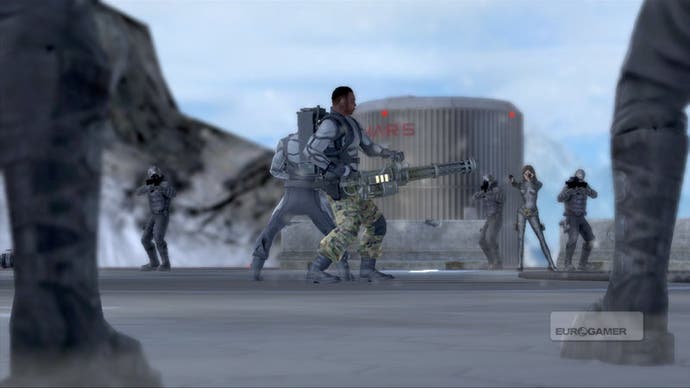G.I. Joe: The Rise of Cobra
Joe blows.
Sometimes, in the often cliché-ridden and underwhelming world of movie tie-ins, a rare gem crops up which defies the odds and makes a silk purse from a sow's ear - a golden leaf which floats against the current of cultural effluent and heads upstream toward the spring of quality, high in the originality mountains.
These against-the-odds surprises, games like Riddick and Ghostbusters, provide welcome relief from the crushing mediocrity of the of churned-out, straight-to-bargain-bin excreta which form the majority of the genre. It's nice to see, however rare.
G.I. Joe is not one of these games. It is, in fact, almost the diametric opposite: a lazy and predictable slog through 20-year-old game design, stultifying 'action' and glaring, ridiculous omissions. There's no defending it on the grounds of being a kids' game, since most astute children will likely find this turgid, unengaging blast every bit as tedious and repetitive as their adult counterparts. Rendered as an entirely forgettable third-person run-and-gun through environments familiar to anyone who's picked up a pad in the last decade, G.I. Joe is the epitome of shovelware.
I was never a fan of G.I. Joe back in the mists of pre-pubescent time. I had two Action Men and an A-Team playset, but never so much as caressed the plastic biceps of these all-American super-soldiers. I don't, in truth, know all that much about them. What I do know is that they were terribly successful - selling millions worldwide and enriching the lives of children everywhere with daydreams of violence and just retribution. The reboot which accompanies the film and game, then, was always going to be a big ask - and typically it took the form of an increased edginess, higher levels of technology and violence, and the surgical removal of whatever charisma an imaginary vinyl killer could possess.

The characters, stripped of their individual charm by the black-suited monoculture of the film's tough new style, are forgettable yet numerous - with the anodyne lead Duke heading the charge toward stereotype. Whilst the dozen or so playable characters offer a little variation in playstyle, usually via the medium of armament, none has the necessary chutzpah to carry a story. Their inane, gung-ho military chatter is delivered with the enthusiasm and verve usually associated with Chris Martin after an afternoon in Valium valley. Ranging from the dull to the outright annoying, they are little but fleshed-out trigger fingers. It's a sad depreciation of the individuality which made the line such a success.
Gameplay is similarly grating. Hampered by an incredibly shoddy and unhelpful camera, which is entirely out of the player's control, it's a linear progression through such inspired environs as the icy forest, the sandy desert and the mid-Wednesday-afternoon Sainsbury's. The lack of perspective offered by the camera really shouldn't be underestimated - off-screen enemies happily blast away at you, corners are navigable only by luck and blind faith, and backtracking means trotting directly into the viewpoint - with no way of knowing what awaits unless you're some kind of digital Magellan.


